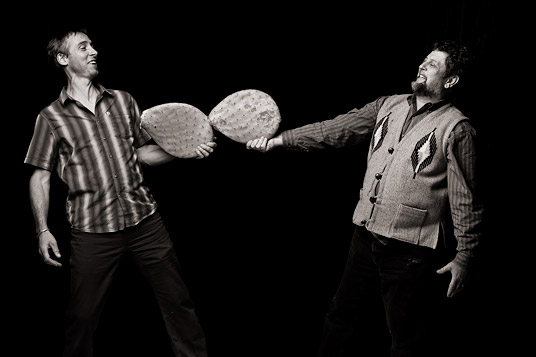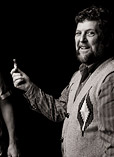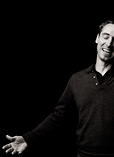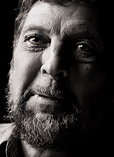
Gary Paul Nabhan & Josh Tewksbury
Binoculars of our age
THEMES: Challenges & Opportunities, Definitions, Technology | WORKSHOP: Natural History & Society
Biographies
Gary Paul Nabhan
Gary Paul Nabhan grew up in the Indiana Dunes under the influence of his Lebanese relatives and great naturalists such as Henry Cowles, Donald Culross Peattie and Edwin Way Teale, and did his first "wilderness solo" there at the age of sixteen. After dropping out of high school and working at the Environmental Action national headquarters for the first Earth Day, he went West to Prescott College. It was there that he fell in love with both field biology and narrative natural history. He went on to the University of Arizona for a masters in agricultural botany and a PhD in arid lands resources, simultaneously working in ethnobiology, nature writing and conservation biology. He has published twenty-four books ranging from The Forgotten Pollinators to The Geography of Childhood to Coming Home to Eat. Nabhan currently lives in Patagonia, Arizona where he is involved in collaborative conservation of working landscapes, nectar corridor restoration for migratory pollinators, and genetic resource conservation of native and Mission-era Spanish and Arab food crops.Conversations:
- An act of creativity
- A predictive science
- Binoculars of our age
- On the railroad with binoculars
- Sky dance
- Packrats
Workshops:
Josh Tewksbury
Josh grew up on farms, went to a high-school with a 3,000 acre campus composed mostly of oak trees, and spent his undergraduate career learning natural history at Prescott College, focusing on butterflies, plants and birds. Studies of birds sustained him through graduate school in Montana, and his inability to stop looking at plants (in particular, chili peppers) led him through a couple of post-docs and on to the University of Washington. He has been there since, working primarily on interactions between plants, animals, and their environment. He is an ecologist, a naturalist, and a conservation biologist; co-founder and board member of the Natural History Network, co-director of the Ecology of Bird Loss Project, and founder and chair of the natural history section at the Ecological Society of America. His research centers on the study of mechanism, process and context, and has spanned studies of fragmentation, connectivity, climate change, food security, and the consequences of lost mutualisms.Conversations:
- A predictive science
- Binoculars of our age
- The first human endeavor
- Ten thousand pictures
- An exciting time to be a naturalist
Workshops:
Transcript
Josh Tewksbury: A lot of what I see the great naturalists doing is observing the world with the best tools they have, and using all the tools at their disposal to find out how the world works, as much as possible, how things are related to each other. And that flies in the face of this antiquated idea of natural history. In other words, these were the pioneers with the best technology of their time. What does the current naturalist look like? What should we be imagining for the 21st Century naturalist? How is it different from who we are, who they were, and what are these threads that make it the same?
Gary Paul Nabhan: And that's why I love your phrase 'natural history for cyborgs.' We're really now at a point in time when we have a great variety of sensory extending technologies at our disposal. Which means we can discern the fragrances of a flower at a much finer lever than we ever could, and see which ones are really attracting the animals. If we know that capsaicin in chilies is odorless and colorless, well is it the pyrazines that are attracting animals to them, or is it the color? And we can begin to tease out those variables through these other tools. But it is still an extension of the way we make sense of the world, rather than us randomly saying no, this technology, like binoculars, is good, and a scanning electron microscope is bad. That's absurd.
Josh Tewksbury: Right. I think your example is perfect. Because what we do now to figure out the natural history of pollination preferences of moths coming to flowers, and what the attractants are, it's chemical ecology, it's chemistry, it's using a mass spec. And that tool, it's the binoculars of our age.
Gary Paul Nabhan: That's right.
Josh Tewksbury: It's no different than the binoculars from before. By ceding that ground, we've lost a big part of the excitement of natural history. By saying, "that's not natural history," it's sort of like cutting off your own foot.
Gary Paul Nabhan: And I think how impoverished my own life would be if I didn't use those extensions. If I hadn't been able to go down with scuba equipment to see the ocean bottom and the incredible life that's there. If I had been cut off from that, my whole view of the world would be different. And I could say the same about understanding the microbes that are in my own gut, or in my ears and nostrils. Why would I want to close myself off from learning about the ten million microbes that share my body with me, just by saying that technology make me a geek instead of a naturalist?


